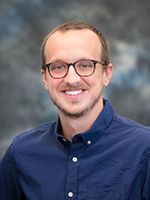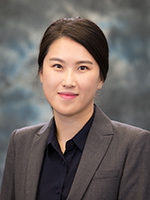 Charles Hages, Ph.D., an assistant professor in the Department of Chemical Engineering, has received a National Science Foundation CAREER award. His research focuses on developing next-generation semiconductors for energy research.
Charles Hages, Ph.D., an assistant professor in the Department of Chemical Engineering, has received a National Science Foundation CAREER award. His research focuses on developing next-generation semiconductors for energy research.
With this award, Dr. Hages aims to develop solution-based, thin-film semiconductor materials that would lead to an improved method of generating clean and renewable solar energy.
“Renewable energy is necessary for a better future, so it’s important to put the effort in now to discover promising new materials which can make this a reality,” said Dr. Hages. “I think we have an exciting vision and talented graduate students which can make a significant contribution to this effort. Though research is only half the battle – I’m excited this award also supports our goals for cross-generational public outreach in renewable energy education.”
This prestigious award will allow Dr. Hages’ research group to develop a new class of materials, chalcogenide perovskites, as a low-cost, non-toxic, and stable photovoltaic material which can replace existing technologies due to their improved properties. Chalcogenide perovskites are an emerging class of semiconductor with the potential to replace the ubiquitous organic-inorganic hybrid metal halide perovskites as a high-performance photovoltaic absorber due to their improved stability and use of earth-abundant constituents. To meet this challenge, Hages proposes a paradigm shift in the approach used to synthesize chalcogenide perovskites by using reactive nanomaterials – a research area in which Hages’ lab specializes in.
This award will also support the development of cross-generational STEM education and outreach in renewable energy, which includes developing and delivering tailored educational modules for the underserved local aging community and K-12 students. Research is also integrated with training and education for graduate and undergraduate students in teaching, technical communication, and in emerging energy technologies.
“Dr. Hages’s research to develop materials for clean and renewable solar energy through a combination of nanoscale synthesis and state-of-the-art materials characterization is an exciting example of the relevance and impact of chemical engineering research in solving one of society’s most pressing problems,” said Dr. Carlos M. Rinaldi-Ramos, Chair of Chemical Engineering at UF.
Dr. Hages holds a Ph.D. in Chemical Engineering from Purdue University and a B.S. in Chemical Engineering from the University of California, Santa Barbara. He was also a postdoctoral fellow in the Department of Structure & Dynamics of Energy Materials at the Helmholtz-Zentrum Berlin in Germany prior to his appointment at UF.
 Yeongseon Jang, Ph.D., an assistant professor in the Department of Chemical Engineering, has received a National Science Foundation CAREER award. With this award, Dr. Jang aims to develop a synthetic protocell constructed of protein building blocks through tuning their self-assembly behavior.
Yeongseon Jang, Ph.D., an assistant professor in the Department of Chemical Engineering, has received a National Science Foundation CAREER award. With this award, Dr. Jang aims to develop a synthetic protocell constructed of protein building blocks through tuning their self-assembly behavior.
“Synthetic versions of protocells that mimic primitive cells assembled from biomacromolecules can serve as simple, precursor models of living cells and can advance understanding about the basic rules of life,” said Dr. Jang.
This prestigious award will allow Dr. Jang’s research lab to develop design strategies to control the properties of new classes of protein-powered synthetic protocells. The proposed protocells will be created by self-assembly of recombinantly engineered proteins, resulting in cell-like structures exhibiting specific activities. Ultimately, the synthetic protocells will serve as smart, autonomous cell-like particles that can be used for a wide range of applications from protein delivery systems to micro-bioreactors.
This award will also provide hands-on learning opportunities to underrepresented students from middle school to graduate students, and to develop academic curricula on the self-assembly of recombinant fusion proteins.
“Dr. Jang’s work to elucidate the principles of fusion protein assembly into protocells is an exciting example of how our faculty combine fundamental chemical engineering principles and cutting-edge biotechnology tools to obtain deeper understanding of biological systems and develop novel solutions to pressing problems,” said Dr. Carlos M. Rinaldi-Ramos, Dean’s Leadership Professor and Chair of the Department of Chemical Engineering.
The Jang SMART-Bio (Soft Matter Assembly and Recombinant Technology for Biomaterials) Lab seeks to provide fundamental and practical insights into the field of supramolecular biomaterials, inspired by nature. These biomaterials include multi-compartment vesicles, nanostructured polymer thin films, and a variety of self-assembled structures, which can serve as artificial cells, drug-eluting thin films, and antibacterial surfaces.
Dr. Jang holds a Ph.D. and a B.S. in chemical engineering from Seoul National University.
CAREER awards are the NSF’s most prestigious award for early-career faculty and are designed to help provide a foundation for a lifetime of scientific leadership. The awards are given to an outstanding scientist who exemplifies the role of teacher-scholars through research, education and the integration of education and research.
